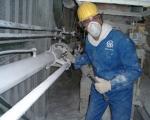Looking for a job when you already have a job can be quite difficult, but it is one of the best things you can do for your career. Many people only look for a job when they are forced to, and this forces them to look for a new position very quickly. When you are looking for a new job, you are “safe” while in your old one, and this allows you to choose the best offer. In this article, we will tell you how to search for a job when you already have a job and walk you through some of the most difficult aspects, how to realize your goals, how to start your job search effectively, how to apply, interview and accept new offers. without destroying your relationship with your current employer.
Steps
Part 1
Stay professional while looking for a new job
-
Don't tell your boss or co-workers that you are looking for a job. In most cases, it is better to keep this a secret from your current employer. Even though there is nothing wrong with this, your current employer may take it personally or show concern that you are no longer focused on your job.
- Telling your current employer that you are looking for a new job could damage your relationship and prevent new opportunities or promotions within the company. If your search for a new job is unsuccessful, it can only be harmful.
- Also be very careful about telling coworkers that you're looking for a new job, even if you think they can be trusted. If to colleagues, the chances increase that your boss will hear about it. If you end up leaving, your manager should hear it from you, not from office gossip.
-
Don't include your current manager as a reference person on your resume. Many employees make this mistake. This can backfire when a potential employer calls your current boss, who has no idea you're currently looking for a job.
- Putting your manager on this list without telling him about it is very unprofessional and could ruin your relationship with him. He may also give you a negative recommendation, making you less likely to get a new job.
- Instead, include previous employers and colleagues, preferably those with whom you had a good relationship.
-
Be careful with the information you post on social networking sites. While professional sites like LinkedIn can be a great tool for professional advancement, business networking, and knowledge sharing, you should be careful about what information you put on your profile.
- When using these sites, do not advertise the fact that you are actively looking for a new job, or at least make your profile non-public.
- Don't upload your resume to job sites because someone in your company could easily see it and alert a manager.
-
Look for work on your own time. When looking for a job, it is very important to manage your time correctly. You should look for work in your free time; Do not use your work computer to search for a job or your work email to send your resume.
- If you search during working hours, you may even get fired for it. Therefore, it is very important to be professional and maintain a good relationship with your employer.
- Look for work in the evenings and on weekends. It can be very tiring working full time And look for new opportunities, but the time and effort will pay off once you get a new job and can leave your current job on amicable terms.
- Keep in mind that even if your current employer finds out you're looking for work, you may not get in trouble if you haven't used company resources.
-
Don't include work email or phone number on your resume. You shouldn't do this, since most companies monitor employee systems and their Internet activity.
- If you need to talk to a potential employer during the workday, try doing it during your lunch break and on your personal phone. Try to get out of the office, this will reduce the likelihood that someone will overhear your phone conversation.
- Use personal email to contact potential employers and try not to check it during the day. Check it once a day when you get home from work. If you need to respond to an email as soon as possible, try doing so during your lunch break from your personal device.
-
Try not to schedule an interview during work hours. If possible, do not schedule your interview throughout your workday. Try organizing it before or after work, on weekends, or during your lunch break (time permitting). This is the most professional approach, and your potential employer should respect you for it, even if it's not as convenient for them.
- If you can't do this, take some time off from work to attend the interview. Don't say you're sick, tell your boss that you need some time to resolve "personal issues."
- If you're planning an interview after work or during your lunch break, pay attention to what you're wearing. If you usually dress casually for work but suddenly show up in a suit, your boss and co-workers will know something is up. Try going home to change before your interview, or take your clothes with you.
-
Accept a new job offer before how to quit your current job. If you have found a suitable position and received a job offer, make sure you accept the offer, your references are checked and you are ready to start working before how you quit your current job. The last thing you want is to find yourself not being hired when you've already left your old job.
- Remain professional by notifying your current manager appropriately and transferring your responsibilities. This will help avoid offending your colleagues and bosses.
- This will also reassure your new employer that they have chosen a reputable person with a high level of professionalism.
Part 2
Search for a new job intelligently and effectively
-
Make a short and long term plan for your career. Finding a new job is a big step, so it's important to be organized and have a plan. Ask yourself about your current role, be honest with yourself. Once you understand what's missing from your current position, you can figure out what you want in your new one.
- Try to identify your strengths and weaknesses and your skills. Ask yourself if you are happy in your current role and if it allows you to reach your full potential.
- Answering these questions will help you understand yourself better, which will give you a clearer idea of the direction you want to take your career.
- Once you have decided on your direction, you can create a 6-month plan and a 2-5 year plan. Making detailed career plans will help you stay focused on your goal and avoid becoming complacent.
-
Decide on the jobs you want to apply for. Once you've made a plan and know where you want your career to go, the next step is to determine the type of job you want to apply for.
- Having a general idea of your career direction can help you streamline your job search process. Look on job boards, job listings on certain websites, and company job listings on LinkedIn, and search for the position or field in which you want to work.
- You can look at similar positions in other organizations and compare them to your current position. Additionally, you can look at higher-level positions or in a different field and see what skills you already have and if there are skills you are lacking.
- Don't worry if your skills or experience don't match the job description exactly - at this point you're just trying to get an idea of the job market and positions that might be of interest to you.
-
Update your resume to include your current job. If you haven't already, update your resume to include your current job. Write down any new skills you've learned in your current job, link them to your goals and what you want from your new position.
- For example, if you want to change your career, prepare a functional resume highlighting your professional skills. If you are looking for a position similar to the one you held, it is worth creating a resume presenting your relevant work experience in chronological order.
- It's worth getting into the habit of updating your resume every three months. This way you constantly review your responsibilities and work towards your goals. Even if you are not actively looking for a job at the moment, you never know when a new attractive opportunity will arise.
-
Write a sample cover letter. In addition to your resume, you will need to include a cover letter with each of your job applications. A cover letter is a chance for you to highlight important information in your resume and provide additional details. It also allows you to describe why you want to work for this particular company and what personal skills and experience are suitable for this job.
- Before you begin the job search process, it's worth writing a cover letter that you can then tailor to specific vacancies. The template you have will help you save time later.
- It is important to tailor your cover letter to the specific job you are applying for. Generic cover letters are boring to the reader and don't allow you to stand out from other applicants. A good, tailored cover letter will show a potential employer why you want to work at their company and how you could contribute by working as a team.
Are you getting fired? Got laid off? Have you decided to change your profession or place of work? Now you will learn how to find a new job without risking your own well-being.
Part-time work
Situations can be different, for example, you want to increase your income and are looking for an additional source of income. Let's figure out how to find a new job while still in your old place.
There are professions and positions in which part-time work is prohibited by law. You were probably warned about this at the hiring stage, so think a hundred times before looking for outside work. Please note that part-time work is not a one-time job, but regular work in your free time from the main rate. It is regulated by labor laws.
A situation is possible when the ban on part-time work is the whim of the employer. Usually this point is fixed in the employment contract, but has no legal force. Most often, the employer knows about the illegality of this restriction and turns a blind eye to part-time workers, because in the event of a summons to court, the truth will not be on his side.
The only thing that threatens you if you are exposed is a damaged relationship with your superiors. Weigh the pros and cons. Think about how much you value this place and whether it is worth holding on to if the employer violates your rights.
Internal and external part-time work
So where to find a new job? There are two options for you: open, when the employer is aware of your plans, and secret, when you decide to hide the presence of a second job from your superiors.
In the first case, an excellent part-time option could be working in your own company - this is called internal part-time work. Voice your desire to management, perhaps they will accommodate you.
If you decide not to advertise your search for a second job, none of your employees should know about your intentions; the likelihood that the information will reach your superiors is almost one hundred percent.
Change of profession

At any age, with any position and income level, a person can decide to change his profession. According to statistics, about 40% of Russians are ready for such drastic changes.
The first thing you must be sure of is that this is not a momentary impulse caused by fatigue or disagreements with your superiors, but a balanced and deliberate decision. A sudden change of profession is a difficult process, and if you have extensive experience in a certain field, it is doubly difficult.
The main mistake of most job seekers is that they don’t know what they really want. Forums are littered with posts where people who have worked for decades in some field ask for advice on changing directions. Can anyone know better than you yourself what your calling is? Let’s not discuss the technology for identifying hidden talents now; there is a lot of good material about this on the Internet. Let's talk better about the pitfalls.
You must understand: any field of activity is a rut. The longer you drive along it, the deeper it is and the more difficult it is to get out of it. Have you gained a certain professional weight, built up a reputation and client base? Maybe you should think about your own business?
In a new place, you will have to start everything from scratch, perhaps from the lowest paid position. It is possible that you will learn the basics from young colleagues, and your manager will be much younger than you. Are you able to adapt in such conditions? Will you be able to feed your family at the initial stage?
Airbag

If you are not afraid of difficulties, you have realized the risks and are ready for change, try to realize your plans with the least loss for the family budget and nervous system. Perhaps a good option would be to look for work in related fields. This way you can use your accumulated knowledge and experience.
An excellent option would be to work part-time in your desired field or do a part-time job. When the position in the new place is strengthened, you can quit your main job and completely devote yourself to what you love.
It will be useful to attend seminars and undergo additional training, especially if your current job has nothing to do with the activity you plan to do.

Dismissal due to staff reduction
Yes, this happens. Even successful specialists are being laid off. The first thing every employee thinks about after receiving a warning from the employer and recovering from the blow is: “Will I find a new job?”
The main thing is not to become discouraged. The first place to look for a job is your field of activity and related areas. At the same time, notify all your family and friends that you are searching.
If, despite the dismissal, the relationship with the employer is good, agree with him about the opportunity to be absent for interviews during working hours. More often than not, management will accommodate the employee halfway. In some companies, this point is stipulated in the employment contract.
It’s a good idea to think about an action plan in case you don’t succeed in getting a job in your specialty. Remember your hobbies and talents. Perhaps it's time to turn your hobby into a profession? Prepare several resume options in areas in which you could realize yourself.

Dismissal at your own request
If you are not satisfied with the working conditions, you should start looking for a new place, but there is no need to quit until you have found a suitable option. You could jeopardize your financial well-being if the search takes longer than you planned.
Safety precautions
Some try to blackmail management, hinting at their possible departure and thereby trying to achieve improved working conditions or higher wages. This can work if you are a truly valuable and irreplaceable employee. Otherwise, they may immediately show you the door behind which applicants for your position are already waiting. Start your search without informing company employees and attending interviews on your own time.
If you decide to “burn your bridges,” then create a small financial reserve that will allow you to hold out during the job search process.

Job search
Speed is one of the main criteria for the effectiveness of your efforts. The more active you are, the faster you will find a job. Often people left without work plunge headlong into household chores, taking on the responsibilities of housewives. You may like this at first, but in the end it can lead to serious psychological problems, especially for men.
Don't panic or get discouraged if you are left out of work. You can find a new job at 40. How you set yourself up will be the way your search will go.
Below are some tips on how to find a new job safely and quickly.

Applicant's cheat sheet
- Try to increase your chances of success by notifying all your friends and family that you are searching. This simple measure can save you from further hassle; perhaps one of your close friends or relatives will help you find a new job.
- If you are already unemployed, register with the employment center at your place of residence. This will provide you with some quick and useful information about new jobs in your area while you search. A center staff member will regularly inform you about job fairs and meetings with employers. Along the way, at the center you will be able to take free advanced training courses or learn a new profession.
- Don't relax, keep your work routine: get up at the same time, plan your day and try to strictly follow the schedule. Realize that finding a new place is your job now.
- Don’t waste time communicating on social networks, playing computer games, or reading articles like “How to find a new job using Feng Shui” or “How to attract a job?” Planting rutabaga in a wealth zone and shamanic rituals will not increase your chances of success.
- Create your own version of a resume for each area of activity that you consider possible. Post them on every job portal you can find.
- If necessary, limit viewing the resume of the company you are currently working for. This will not provide a 100% guarantee of safety, but there is a chance of remaining undetected. You don’t have to include your last name and last place of work in your resume; just indicate your field of activity and length of service.
- Do not search for work from your work computer and do not use your work e-mail for mailing. In many companies, the security service regularly checks what employees do during working hours: they control outgoing files and the history of visits to third-party sites.
- Learn to filter out offers from fraudulent companies. If, after reading the text of the vacancy, you could not understand what the organization does and you are also promised fabulous profits, do not waste your time. As a rule, such companies position themselves as transnational corporations that, on the eve of establishing world domination, allow you to jump on the last car and grab your piece of the pie.
- Train, gain experience. Try to go to all interviews that are assigned to you. You will learn to communicate correctly and confidently with representatives of HR services, answer awkward questions, take tests, accept refusals and refuse yourself - this increases your self-esteem.
- Is it tempting to accept the employer's first offer? Agree if it really meets your requirements. Otherwise, you will miss the chance to find a good job. You will lose mobility and will not be able to go to interviews during working hours, each time you will have to explain to a potential employer why, having recently got a job, you are looking for a job again.
Autumn is the best time to change jobs, at least according to business coaches and other representatives of the motivational community. The holidays are over and there is a noticeable recovery in the market. An increase in employer activity is an expected September trend, which often plays into the hands of job seekers. The recruitment opens in almost all categories, as a result of which candidates can find and choose the most optimal offer. If they have certain qualifications, of course. But there is also an influx of candidates who decide to change jobs just after the summer vacation.
Personnel officers are cautiously preparing for the autumn surge: resumes, applications, and therefore the volume of their work increases significantly. Not only qualified specialists are applying for jobs, but also those who have graduated from universities, who have returned from seasonal work or, for example, a summer rural garden. Increased activity is observed not only among entrepreneurs and companies, but also in the job seeker sector. So why then is autumn considered so favorable, and is it even worth pursuing employment in the fall? The answer is obvious: depending on who and where!
To whom and where?
It is believed that in the fall it is most difficult to get a job with low qualifications - in a low salary range. This is, in particular, trade, a number of blue-collar professions, housing and communal services, work in large supermarket chains, etc. Often such positions are vacated in the spring - workers prefer to spend the summer period, for example, in the country, in higher-paying seasonal agricultural work or in a resort area. In the summer, many vacancies are filled by schoolchildren and students, who begin studying in the fall and again vacate their positions. But seasonal workers return in the fall, and the behavior of employers in this case is very logical and expected: Preference is given to proven, albeit former employees - those who have already managed to prove themselves. Naturally, “newcomers” in this case will only be able to apply for new positions opened in new organizations.

Those vying for higher positions will also have to compete. In the fall, many specialists who have reached the peak of their careers in companies where they have worked for many years decide to change jobs. Plus, they are complemented by those who decide to radically change their occupation. There are several simple explanations for this. Firstly, they are preparing for spring, after all, it is after a fruitful autumn-winter period that managers are paid annual bonuses. And this is a very pleasant increase, sometimes exceeding a couple of monthly earnings. Secondly, before starting a job at a new company, it’s a good idea to have a good rest. Everything is logical, because at the new place of work it is unlikely that vacation will be given earlier than next summer. And besides, there will be a new surge in personnel activity no earlier than after the New Year holidays, and that is still too far away.
But all this creates an increased supply in the labor market. According to the laws of economics - the higher the offer, the cheaper it is, which does not play into the hands of applicants. While this may not affect the level of salaries, the demands of recruiters definitely increase. Everything is logical: having 20-30, or even 50 resumes on the table for one vacancy, HR officers justifiably increase the requirements for candidates, finding for themselves the most optimal offer according to the “price-quality” criterion. In the summer, for example, if there is an urgent need to fill personnel holes, HR can be much more lenient towards applicants, since there is not much to choose from. But this doesn’t happen in the fall; in the fall they always demand more, but try to offer less.
Not the best odds
Personnel officers do not deny that autumn is probably the hottest season for them in recruiting employees. And this is caused not only by the influx of candidates for employment, but also by the activity of the companies themselves. They perceive autumn as a real “fishing season” - finding a decent specialist in September-October is much easier than ever. Plus, it helps you make plans for the future. Hiring a new employee allows management to “break in” him before the end of the year, and based on the results of this 3-month “test drive”, draw certain conclusions and make financial plans for the next year. Including taking into account the requirements for the selection of employees for the post-New Year period. None of them hides the fact that the autumn selection will be really tough and not everyone will be able to pass it. Therefore, you should not quit your old job before finding a replacement - the risk of fiasco is high.

The upcoming New Year's demand forces retail chains to increase their activity; for the same reasons, sales representative offices of manufacturing companies are recruiting agents and salespeople. To implement new digital projects, IT companies select personnel, and construction organizations open recruitment for future interior work. In general, experts talk about a certain cyclical nature of the Russian labor market, which is associated with many public holidays, New Year holidays, seasonality of recruiting, etc. For these reasons, it is the autumn period that becomes the most favorable and fruitful in the HR field, which gives rise to real paradoxes for the labor market: the number of open positions is increasing noticeably, but finding a job, on the contrary, is becoming more difficult.
And then, if you understand the situation, considering the structure of the movement of labor in the market, it turns out that not everything is changing that much. So, it is quite logical that vacancies appear not only due to new projects, but as a result of the dismissal of those who decided to change jobs. They, in turn, in most cases occupy open positions in competing firms or firms from a similar industry. It turns out to be a circle of market specialists. Well, the main indicators of the surge in activity are formed due to seasonal work and offers at a low salary scale and appropriate qualifications.
The main thing is not to rush!
It turns out that September-October is not the best period for finding and changing a job?! But what about those who have already decided to make changes in life and career, but have not yet received worthy offers? The main thing is don’t rush! You shouldn’t rush to quit, you shouldn’t rush to sever business ties, and you shouldn’t rush to find a job either. Of course, looking for a new job while remaining at your current job is not the easiest task, especially for a full-time specialist. However, his chances of taking a more competitive place are much higher. The logic here is very clear: an unemployed job seeker sits at home and is unlikely to wait for a good offer, so he will agree to not the best offers, because he has nowhere to go. Anyone who searches while working, on the contrary, can count on a more loyal attitude and a pleasant offer. If an employer is interested in a working candidate, they will have to “outbid” him with good conditions.

An equally important principle of September recruiting is to try to reach all employers who have generated interest. It is not recommended to focus your job search exclusively on a narrow area of your activity - pay attention to other sectors. If you work as a journalist in a newspaper, try yourself in television; as a legal consultant at an enterprise, try to get into a bank or, for example, a bar. Regardless of your specialization, the larger your resume, the greater your chances of finding a new and interesting job.
If you are asked about your desired income level, don’t be afraid to ask for more.. It doesn’t matter where you are trying to get a job, even in a field about which you have a very mediocre understanding. Why? Otherwise, what is the point of changing jobs if your income level does not increase?!
It's time to change jobs
But the point is that sometimes there is, and it’s very serious. Sometimes we don't notice that the world around us is changing irreversibly. How do you understand that the time has come when it’s time to change jobs? We have identified 4 obvious signs, if at least one of them is present, something will have to be changed. So, you need to change jobs when:
- No time for personal life. Career, experience, financial status - this is certainly impressive. But what is the point in all this when there is nothing else besides work? Hardly any careerist dreams of belonging to himself only at breakfast or, for example, in the evening shower. A good salary, a respected position, the presence of subordinates - all this makes sense if it also leaves time for life.
- Lack of career growth. The situation is very common when experienced employees are not promoted in order to save a place for those who come “through patronage.” There are two options here - either ask for a promotion or leave. Everything is logical - promising specialists need promotion every 3-4 years.
- Work is no longer interesting. The best job is the one that is interesting.
- Low salary. Probably the most common reason for changing jobs. And if an interesting option comes up, feel free to move on, New Year’s holidays, corporate events and pleasant bonuses are ahead.
You leave your home in the morning in order to spend the whole day at work, which has not pleased you for a long time. You imagine with horror the production atmosphere that you will have to plunge into again. Maybe it's finally time to quit and change jobs? “Goodbye, fed up boss! Continue to remain surrounded by obedient, uncomplaining humanoid robots! I’m going in search of a better destiny!”
We decided to present a list of serious reasons for leaving work and rebooting the life cycle.
There is a desire, but no determination
Let's imagine a standard situation. The average citizen has been going to the same workshop or office for forty years to perform certain ordinary actions. At home he has one team, but at work - a completely different one. Pendulum swing. A work schedule brought to the point of automaticity, followed by a dull rest in an apartment with a TV. Question: How much patience does a citizen have?
The decision to throw everything to hell and do something more interesting and useful does not come out of nowhere and suddenly. For many people, the decision to quit their job takes many months or even years to decide.
✓On the one hand, many of us want a change of scenery and festive novelty.
✓On the other hand, the fear of change does not allow a person to flap his wings and rush into the unknown.
Changing jobs is not a trivial action. This is an important life step that a person has to decide on personally. He needs to take full responsibility for the difficult choice. No one is immune from costs. At the same time, the winnings may exceed all expected results.
Ten situations that force you to make a decision
1. Work that contributes to a bad mood
“How quickly the weekend flies! It's already Sunday. After lunch my mood began to deteriorate thoroughly. It's simple - the hour of reckoning for the rest provided is approaching. In the morning you have to go to work. Even the very thought of this brings me unbearable suffering!
You can’t even imagine the huge number of sufferers who have to go through something like this. There is nothing worse than a profession that makes you sick. No monetary reward will compensate you for the loss of peace of mind. Why this is so is the most important question that you will have to answer honestly.
If you accumulate negative impressions at work, they will have to find a way out. Most likely, it will be at home, with family. This means that a bad mood will accompany you everywhere. The world will turn into hell. Smart people say that man is created for happiness, but where to get it from?
ADVICE. To avoid such a sad result, isn't it better to just change jobs? Reboot yourself in a new positive way.
2. You are not capable of becoming a mirror of the work collective
As an employee, you are an integral part of the company, representing its interests and values. In any case, this is how it should look ideally. What does it mean?
You will have to constantly check your activities with the general production course. Woe to the worker who has not learned this simple truth. But there are also such unpleasant aspects as:
✓low wages;
✓bullying of work colleagues;
✓unfair punishments and dismissal for minor offenses;
✓psychological costs of feedback from the client;
✓a lot of shortcomings regarding social and industrial relations;
✓dissatisfaction with the impossibility of creatively demonstrating one’s extraordinary abilities.
This is not a complete list of possible problems. There are many obstacles to standing up for your favorite (unloved) company, protecting it, and not your own interests.
ADVICE. In the long run, all these costs spell a lot of trouble. It's time to carefully weigh all the pros and cons.
3. The company started having serious problems
Rats are known to be the first to leave a sinking ship. There is an unclear future ahead, but you remain loyal to the company’s management. You don't want to look like a traitor. This, of course, is a manifestation of everyday naivety. You are an ordinary worker. All the high-calorie cream is licked without you. Management has long been insured against future adversity. You are not included in the company's profit. Solid red lights warning of imminent bankruptcy - isn't this a reason to transfer from an unreliable ship to your own little life-saving boat?
ADVICE. Do you want to be left without severance pay and looking for a new job at the most inopportune moment in your life? Do everything on time.
4. The boss decided to make you a “workhorse”
Overtime work for three people, performing unusual functions, emergency work, changing the work schedule. Probably many of us have encountered such blatant lawlessness. Sometimes this practice pays off, but most often it doesn't. Each employer establishes labor relations in its own way. They are often unfair and have destructive goals. For example, your colleague may sit in the smoking room for hours and pretend to be working hard. But you don’t have time to raise your head from the table.
Problems can be resolved through an open conversation with the manager. If the boss has a bad character, it is advisable to show some flexibility in behavior. You should not quit your job without using all available levers of influence on the process.
ADVICE. If the futility of your efforts is determined by the already established dictates of injustice and ignorance, feel free to write a letter of resignation. Work should bring joy, not problems.
5. Lack of career growth
This point is important for those people who dream of moving up the career ladder. Perhaps today's work allows you to live comfortably and even often vacation at famous resorts. But on it you run the risk of remaining an ordinary extra until old age. Many people want dynamics, professional growth and development in the field of management. After all, doing the same thing all your life is simply boring.
ADVICE. In any case, a person needs to respond to the needs of the soul. Look for another job.
6. You're bored
This is a serious problem. Let's say you were unhappy with your previous job, where you were very tired. Too much workload caused you to quit. Having changed your career, at first you were happy - the new place is quiet, calm and has few responsibilities. But over time, you began to feel tired from constant inactivity. Now you want to sleep all the time out of boredom. Surprisingly, the new profession became the reason for the stability of the feeling of pain and depression.
ADVICE. It will be absolutely correct to replace relaxing activities with work that brings undoubted benefits to the mind, body and soul.
7. Money, money
People go to work, first of all, to ensure their financial independence. In other words, money plays the most important role in choosing a profession. And at the same time - not by bread alone...
Unfortunately, many employees have to sacrifice their creative needs and genuine interests for the sake of material gain. We should not forget that money is the equivalent of appreciation for your work. A reasonable balance is needed - the choice of profession should be based on internal priorities. At the same time, decent wages are also not in last place.
Is it worth working, for example, as a social worker just because you want to benefit people in this way? It's up to you to decide. But we have the right to doubt, because we can help humanity in different ways.
Learn to demand decent earnings from your employer. If you are a professional in your field, then you undoubtedly deserve it. You can force your requests to be respected only after you have convinced yourself of this. In any case, only a beginner, just starting out in life, can work for pennies. Once you have become a qualified employee and are worth something in your profession, working for nothing makes no sense. This is bad from the point of view of the distribution of vital energy. But money is not the main thing in life.
ADVICE. If you are dissatisfied with your profession, it is time to think about new prospects for the future.
8. Fatigue from mental stress
Leaving a job due to scandals, production disputes and the inability to find a common language with the team is not so uncommon. However, accumulated stress cannot be an excuse for throwing a pen or hammer at a colleague in a fit of anger. You will have to look carefully for the root of your own and common problems. Why has psychological overload reached such alarming levels?
You can easily burn out in any job. And then the question of applying for leave will arise. You may need an urgent vacation. Or even a radical change of profession.
ADVICE. Consult a psychologist. After all, you have no guarantee that in your new workplace you will stop taking your anger out on your future colleagues.
9. Collective Nightmare
In any closed society, the preconditions are created for the creation of an invisible hierarchy of authorities. , ridicule, pranks - this is only the beginning of a long list of what a newcomer can encounter in a team, especially without work experience. He will have to decide whether to develop defense tactics and continue to perform his job functions or change his place of work.
Please note that interspecies struggle sometimes increases self-esteem and a sense of satisfaction. The solution to the problem does not lie in replacing the team, since the same difficulties may await you at a new place of work.
Strength and confidence are acquired in mortal fights for life. Nevertheless, there are cases when the search for a new place of work is energetically justified by the fact that it makes no sense to fight with the entire team.
ADVICE. It is honorable to be a lone warrior, but only for a short period. Health must be protected with all diligence and preferably from a young age.
10. Work has lost its meaning
If you want to be happy and healthy, look for a job you like, in which you can show yourself as an extraordinary person. The ideal option is to combine a well-paid job and a favorite hobby. This is a guarantee of using all internal reserves to the maximum. A person should rest at work and work during rest. This is only possible with creative dedication. Issues of labor cost and prestige are, of course, important, but only secondary.
ADVICE. Pride, satisfaction and motivation are a fee in themselves. At a particular workplace you do not have the above components? Then think about where to find them.
Conclusion. Work is life itself
If the reader does not catch the main idea, we will be happy to formulate it. It's simple. Work is not about earning money to live. This is life itself. Anyone who has mastered this postulate is already happy. He won't need our advice.

























